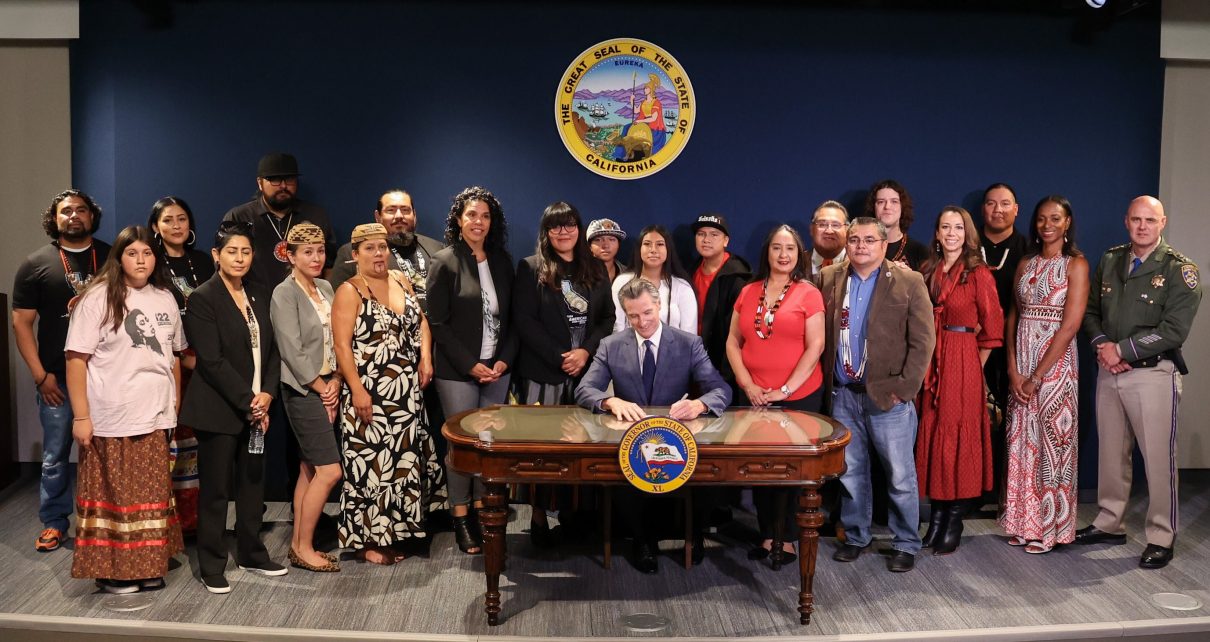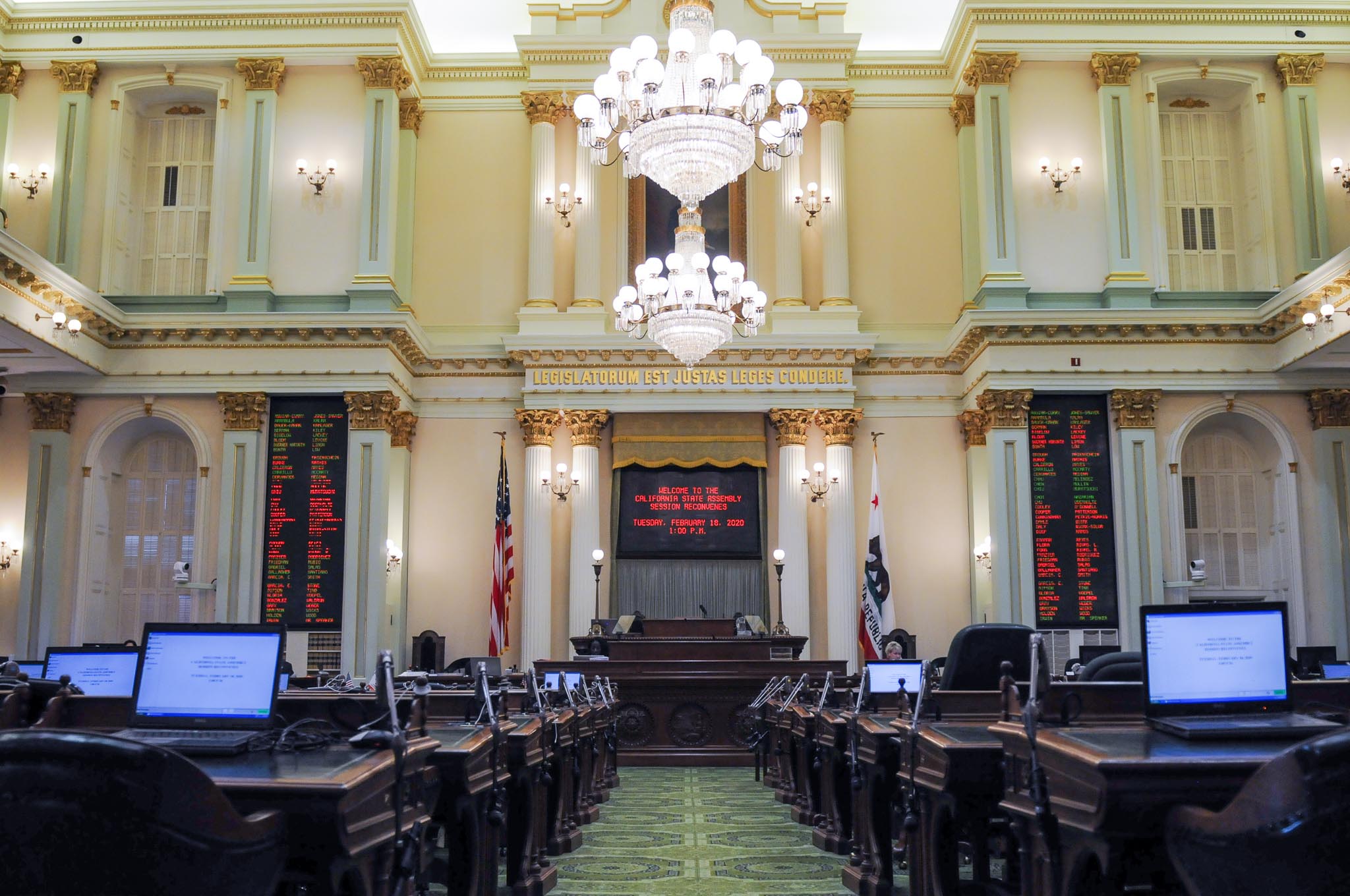
Gov. Gavin Newsom signs AB 1936 into law (Photo: gov.ca.gov)
Lawsuit Filed to Halt ‘Cancel-Culturalists’ Name Change of UC Hastings College of the Law
Name change illegally flouts contractual law and smears Serranus Hastings in the process
By Evan Gahr, October 12, 2022 9:05 am
Last month, California Governor Gavin Newsom signed legislation authorizing the changing of the name of the University of California Hastings College of the Law because namesake Serranus Hastings supposedly orchestrated atrocities against California Indians in the 19th Century.
Now, school alumni and six of Hastings’ descendants have sued the school to stop the name change, arguing it amounts to breach of contract since Hastings made a donation in 1878 so the school would bear his name in perpetuity. They also deny that Hastings perpetrated any atrocities against Indians, depicting him as the victim of a politically correct witch hunt.
The push for renaming the school was sparked by a 2017 op-ed in the San Francisco Examiner by UC Berkeley law professor John Bricoe. He wrote, “Serranus Clinton Hastings was promoter and financier of Indian-hunting expeditions in the 1850s” and cited another academic who wrote a book accusing Hastings of helping to “facilitate genocide.”
In 2020 the school issued a white paper report that said Hastings financed and sponsored a militia in Northern California that killed and displaced hundreds of Indians. The legislation for renaming the school echoed that language, saying Hastings was responsible for “genocidal acts.”
But the lawsuit tells a different story, arguing that Hastings played no role in atrocities against Indians in 1859 and 1860 in Northern California on land he owned.
“Hastings, a lifelong Democrat, was a giant in California history, our first California Chief Justice, and like many founding figures, is the latest victim of activists rewriting history to fit a contemporary agenda, with scant factual basis, no due process, and the ends justifying the means,” California lawyer Harmeet Dhillon, who represents the plaintiffs, said in a statement. “In his time, Hastings was a civil rights leader and neither he, nor his descendants or the graduates of this fine institution, deserve the smear job orchestrated by politicians for their own purposes.”
Richard Flier, a retired Contra Costa Superior Court judge and one of the group of Hastings alumni who are backing the lawsuit, told the California Globe that the name change illegally flouts contractual law and smears Serranus Hastings in the process.
“The actions by the State and the Board of Directors of the school are unfair and [contrary] to the various legal principles taught at the school,” he emailed. “After 144 years, the State reaches the incredible conclusion that it should not have contracted with Hastings. The only thing that has changed in 144 years are two newspaper articles professing a false narrative which captured public attention. Hastings is no longer alive to show the errors of their conclusions. Hastings is being defamed and his heirs are bearing the brunt of the misinformation, and the Native Americans, who never required a name change, are thrust in the middle of the dispute. This is misguided public opinion at its worst and should not be supported by a culture based in law rather than public opinion.”
The lawsuit, filed in San Francisco Superior Court, says, “The State’s decision to erase ‘Hastings’ from the College’s name and remove the family’s Board seat constitutes an unconstitutional impairment of the State’s contractual obligations to S.C. Hastings and his descendants. The State’s retroactively-applied punitive measures against S.C. Hastings and his descendants further violate constitutional prohibitions against bills of attainder and ex post facto laws, as well as the California Constitution’s requirement that the College remain in its existing ‘form and character,’ free from sectarian or political influence.”
It asks for an injunction barring the name change or if that is not issued, alternatively the return of Hastings donation plus interest to his descendants.
The complaint depicts Hastings as a victim of a witch hunt and dissects popular accounts that blamed him for the killing of Indians.
“Despite the College’s success as the State’s first public law school and its long history of educating lawyers and encouraging public service, modern-day cancel-culturalists set their sights on the College’s name,” the complaint says. “Beginning in 2017, critics claimed in a couple of poorly sourced opinion pieces that S.C. Hastings fomented and financed raids by State-run militia on Native Americans in the late 1850’s and early 1860’s and that the College should therefore consider changing its name. Although there is no known evidence that S.C. Hastings desired, requested, or knowingly encouraged any atrocities against Native Americans, the accusations against S.C. Hastings soon snowballed.“
“Critics’ initial accusation that S.C. Hastings financially-backed the State’s militia (of which there is no direct proof), quickly turned into accusations that S.C. Hastings, himself, committed acts of genocide, and eventually culminated in the New York Times publishing a ‘hit-piece’ written by Thomas Fuller on October 27, 2021, which wrongly, maliciously, and baselessly claimed that S.C. Hastings ‘masterminded’ the killings of hundreds of Native Americans, including the Yuki people.”
The lawsuit takes issue with a white paper issued by Hastings law school in 2020 that blamed Serranus Clinton Hastings for the killing of Indians. Far from an objective undertaking it was written by a professor who had already deemed Hastings guilty of genocide. But the lawsuit says the evidence, based on a subsequent investigation by the legislature in 1860, is clear that Hastings had no role in or contemporaneous knowledge of any of the killings.
“The White Paper asserts that S.C. Hastings’ livestock manager, H. L. Hall, mistreated Native American workers and the local indigenous population, which lead to Yuki people purportedly retaliating against the stock housed in the area. That retaliation, asserts the White Paper, led to Hall carrying out brutal raids against the Yuki people. Hall, eventually, in connection with the State Legislature’s 1860 investigation, conceded that he had killed 14 Indians and had provoked the threat in the first place. Although Hall notified S.C. Hastings of the threat to Hastings’ investments, he concealed the killings from S.C. Hastings. After S.C. Hastings learned of Hall’s actions, S.C. replaced Hall as his livestock manager with another local settler and spoke with U.S. Army personnel and others about Hall.”
The conflict, however, soon escalated, the lawsuit recounts.
“As the stealing and slaughtering of livestock [by Indians] continued, S.C. Hastings and other livestock owners and settlers followed State law and drew up a petition asking for the Governor’s authorization for a State-run militia to enforce California law, later dubbed the “Eel River Rangers.”
“According to the White Paper, S.C. Hastings offered to finance the operations of the company until state or federal funds could reimburse those efforts.”
”The White Paper appears to have based this conclusion on statements buried under multiple layers of hearsay; there is no direct proof that S.C. Hastings fronted any money for the creation of this militia,” the lawsuit says.
“The Eel River Rangers, who were organized and managed by the State of California, and not under the control or direction of S.C. Hastings, subsequently massacred hundreds of Yuki people and other Indigenous peoples in what became known as the ‘Mendocino War’ in Northern California.”
A subsequent investigation by the legislature absolved Hastings of any wrongdoing, the lawsuit says. “Despite the California Legislature’s 1860 investigation into these killings, no charges were brought against the rangers for the atrocities committed against Native Americans, S.C. Hastings provided testimony to the investigative committee in the form of a written ‘deposition,’ and neither the committee, nor the California Legislature levied any accusations of malfeasance or impropriety against S.C. Hastings for these events.”
Hastings law school, whose illustrious alumni include Vice President Kamala Harriss and former San Francisco mayor Willie Brown, said in a statement about the lawsuit that legislation for renaming the school “was the result of a lengthy, deliberate and transparent process at the College that included years of thoughtful research, several public hearings and input from a wide range of community stakeholders. The College remains committed to moving forward with the name change, and to continuing our restorative justice efforts with the support of the campus community.”
But Guido Piotti, another Hastings alumnus who is backing the lawsuit, told the California Globe that the name change does a disservice to Hastings students and alumni. Emphasizing that he he was speaking for himself only Piotti emailed:
“In addition to the breach of contract caused by removing Hastings from the name of the college, I support the lawsuit because I want to protect students. Having the Hastings brand on my diploma has opened countless doors for me and many other alumni because of its revered 144 year old history and the respect it commands in the legal community.”
“My sole desired outcome is that the Hastings brand be conserved (i) so that practicing Hastings lawyers are not tarnished by carrying a brand that has been wrongfully shunned and condemned by the very college that gave it to them, and (ii) so that current students who struggled and fought so hard to get into Hastings can get, and benefit from, what they bargained for: the Hastings branded diploma,” he argued. “After all, most reasonable people can agree, one would not pay big money for a BMW branded vehicle and accept a vehicle that is merely branded ‘Car.’ That is exactly what is happening here by California changing the college’s name from ‘Hastings College of the Law’ to ‘College of the Law, San Francisco.’”
- Trump Justice Department to Join Lawsuit Against UCLA Medical School for Illegal Racial Preferences in Admissions Decisions - February 16, 2026
- Federal Judge Rules UCLA Jewish Students Discrimination Claims Against Pro-Hamas Groups to Proceed - February 5, 2026
- California Superior Court Judge Affirms Mob Rule at UCLA - January 17, 2026





It sounds like it’s a breach of contract since Hastings made a donation in 1878 so the school would bear his name in perpetuity and his decendents should be compensated? Hopefully this lawsuit will prevail but considering that most California courts have been captured by leftist Democrats it might be an uphill fight?